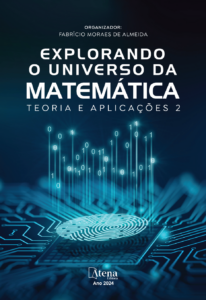The Effectiveness of Near-peer Role Models and Mentoring in STEM Education: A New Publication
We are excited to announce our recent chapter publication, «The Effectiveness of Using Near-Peer Role Models and Mentoring: A Phenomenological Reflection on STEM for Success,» in Explorando o universo da matemática: teoria e aplicações 2. This work, a collaborative effort with distinguished colleagues Bruce Bukiet and James Lipuma, and under the coordination of Fabrício Moraes De Almeida, delves into the impactful LiFE project funded by the National Science Foundation. Our research highlights innovative strategies to foster STEM interest among young girls, an essential step towards achieving gender parity in STEM fields. Despite the challenges posed by COVID-19, the project’s adaptation to digital platforms has broadened the scope of STEM education, making it more accessible and inclusive. This chapter reflects on our findings and serves as a model for organizations dedicated to promoting STEM interest among elementary school girls.
Discover Our Insights
Our chapter in Explorando o universo da matemática: teoria e aplicações 2 offers an in-depth look at the LiFE project’s achievements and lessons learned. By reading our work, educators, policymakers, and stakeholders in STEM education can gain valuable insights into practical strategies for engaging young minds in STEM.
Introduction: The LiFE project is a National Science Foundation-funded initiative that aims to promote STEM interest among girls in grades 2 through 6 in seven school districts in New Jersey. The project utilized a collective impact approach and involved stakeholders in designing and implementing activities, which included professional development experiences, STEM club support, and student showcases. Despite COVID-19 challenges, the project provided online STEM demonstrations and produced freely available digital resources. The project’s after-school opportunities are crucial in engaging girls in STEM activities and developing 21st-century skills. The project’s mission continues through STEM for Success, which provides positive STEM experiences for girls in elementary grades and collaborates with other organizations to promote STEM education. The LiFE project can serve as a model for organizations seeking to promote STEM interest among girls in elementary school.
Presented at Academia Journals:
- Investigación, Educación Integral e Innovación en Matemáticas y Ciencias Exactas para el Desarrollo (B. G. Bukiet et al., 2023)
- Congreso Internacional de Investigación Academia Journals Monterrey 2023 (B. Bukiet et al., 2023)
Read Our Chapter
You can access our book chapter in the book Explorando o universo da matemática: teoria e aplicações 2 (Almeida, 2024, p. 2). Read here
Acknowledgments
We acknowledge support for Leadership and iSTEAM for Females in Elementary School (LiFE) and STEM for Success from the National Science Foundation under award number #1744490 and from Howmet Aerospace Foundation.
Disclosure statement
No conflict of interest pertains to the research presented above.
ORCIDs
Bruce Bukiet https://orcid.org/0000-0001-8172-3937
Cristo Leon https://orcid.org/0000-0002-0930-0179
James Lipuma https://orcid.org/0000-0002-9778-3843
Copyright
Creative Commons Attribution-NonCommercial-NoDerivatives 4.0 International License (CC-BY-NC-ND)
Sources
Almeida, F. M. D. (2024). Explorando o universo da matemática: Teoria e aplicações 2 (1st ed.). Atena Editora. https://doi.org/10.22533/at.ed.789241104
Bukiet, B. G., León, C., & Lipuma, J. (2023). The Effectiveness of Using Near-peer Role Models and Mentoring: A Phenomenological Reflection on STEM for Success [Book section]. In Investigación, Educación Integral e Innovación en Matemáticas y Ciencias Exactas para el Desarrollo (CLDM_Ds; 1st ed., Vol. 15, pp. 1–4). Academia Journals; /Research/Education.
Bukiet, B., Yáñez León, C., & Lipuma, J. (2023). The Effectiveness of Using Near-peer Role Models and Mentoring: A Phenomenological Reflection on STEM for Success [Presentation at Congress]. Trabajos de Investigación, 15, 1–4. /Research/Education. https://digitalcommons.njit.edu/stemresources/35

